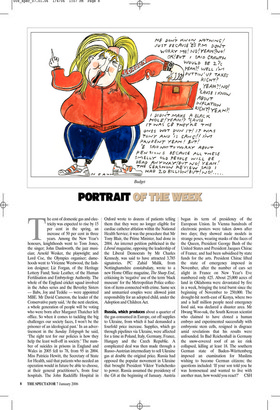PORTRAIT OF THE WEEK T he cost of domestic gas and
electricity was expected to rise by 15 per cent in the spring, an increase of 50 per cent in three years. Among the New Year’s honours, knighthoods went to Tom Jones, the singer; John Dankworth, the jazz musician; Arnold Wesker, the playwright; and Lord Coe, the Olympics organiser; damehoods went to Vivienne Westwood, the fashion designer; Liz Forgan, of the Heritage Lottery Fund; Susie Leather, of the Human Fertilisation and Embryology Authority. The whole of the England cricket squad involved in the Ashes series and the Beverley Sisters — Babs, Joy and Teddie — were appointed MBE. Mr David Cameron, the leader of the Conservative party said, ‘At the next election, a whole generation of people will be voting who were born after Margaret Thatcher left office. So when it comes to tackling the big challenges our society faces, I won’t be the prisoner of an ideological past.’ In an advertisement in the Sunday Telegraph he said, ‘The right test for our policies is how they help the least well-off in society.’ The number of suicides in prisons in England and Wales in 2005 fell to 78, from 95 in 2004. Miss Patricia Hewitt, the Secretary of State for Health, said that patients who needed an operation would in future be able to choose, at their general practitioner’s, from four hospitals. The John Radcliffe Hospital in Oxford wrote to dozens of patients telling them that they were no longer eligible for cardiac catheter ablation within the National Health Service; it was the procedure that Mr Tony Blair, the Prime Minister, had done in 2004. An internet petition publicised in the Liberal magazine, opposing the leadership of the Liberal Democrats by Mr Charles Kennedy, was said to have attracted 3,785 signatories. PC Zahid Malik, from Nottinghamshire constabulary, wrote to a new Home Office magazine, The Sharp End, criticising its ‘negative’ use of the term ‘black museum’ for the Metropolitan Police collection of items connected with crime. Same sex and unmarried couples were allowed joint responsibility for an adopted child, under the Adoption and Children Act.
Russia, which produces about a quarter of the gas consumed in Europe, cut off supplies to Ukraine, from which it had demanded a fourfold price increase. Supplies, which go through pipelines via Ukraine, were affected for a time in Poland, Italy, Germany, France, Hungary and the Czech Republic. A complicated deal was then made through a Russo–Austrian intermediary to sell Ukraine gas at double the original price. Russia had opposed the popular movement in Ukraine that brought President Viktor Yushchenko to power. Russia assumed the presidency of the G8 at the beginning of January. Austria began its term of presidency of the European Union. In Vienna hundreds of electronic posters were taken down after two days; they showed nude models in strange poses, wearing masks of the faces of the Queen, President George Bush of the United States and President Jacques Chirac of France, and had been subsidised by state funds for the arts. President Chirac lifted the state of emergency imposed in November, after the number of cars set alight in France on New Year’s Eve numbered only 425. About 25,000 acres of land in Oklahoma were devastated by fire in a week, bringing the total burnt since the beginning of November to 250,000. The drought-hit north-east of Kenya, where two and a half million people need emergency food aid, was declared a disaster area. Mr Hwang Woo-suk, the South Korean scientist who claimed to have cloned a human embryo and experimented successfully with embryonic stem cells, resigned in disgrace amid revelations that his results were unfounded. In Bad Reichenhall in Germany the snow-covered roof of an ice rink collapsed, killing at least 18. The southern German state of Baden–Württemberg imposed an examination for Muslims wishing to become German citizens; the questions included: ‘If your son told you he was homosexual and wanted to live with another man, how would you react?’ CSH





































 Previous page
Previous page